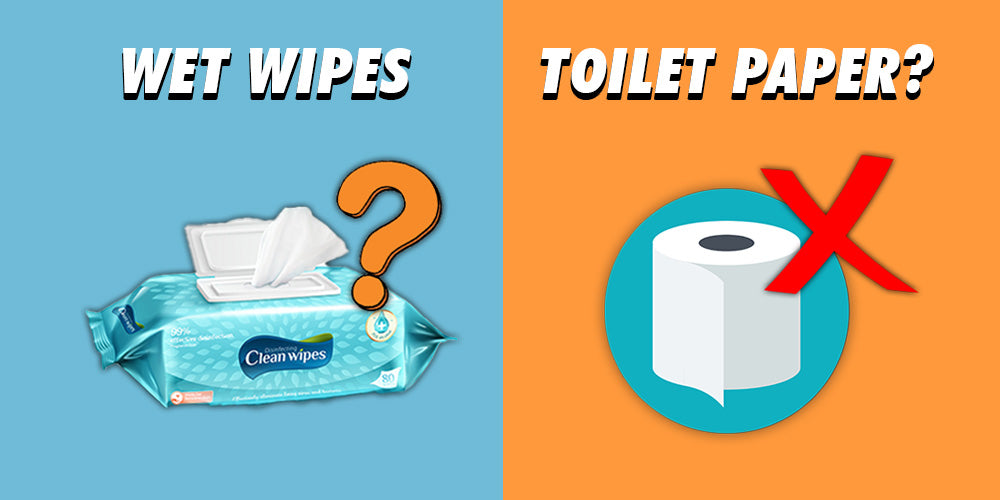In an age of evolving personal hygiene practices, the debate over the best method for post-toilet cleaning is hotter than ever. While toilet paper has been a staple for centuries, the rise of wet wipes promised a fresher feeling. However, beneath the surface of this moist alternative lie several problems, paving the way for bidet seats to claim the throne as the best post-toilet hygiene solution. In this article we will discuss the reasons why wet wipes, although slightly better than traditional toilet paper, is still an inferior method of cleaning oneself after using the toilet.
Environmental Concerns with Wet Wipes
The vast majority of wet wipes are not fully biodegradable. When flushed, they travel to sewage systems and can take years to break down. Over time, this contributes significantly to environmental waste.
Unlike toilet paper, which disintegrates relatively quickly in water, wet wipes maintain their structure. This leads to clogs in private plumbing systems and public sewer networks, resulting in expensive repair and maintenance costs. And yes, even so called ‘flushable wipes’ can and do lead to clogged pipes and expensive repairs.
Health and Hygiene Concerns
Wet wipes often contain chemicals and fragrances to keep them moist and give a fresh scent. For some people, these additives can cause skin irritation, allergic reactions, or exacerbate existing conditions.
Despite the feeling of freshness they might provide, wet wipes don’t always offer thorough cleaning. Residue can be left behind, leading to discomfort and potential hygiene issues. We often ask prospective customers: “if you were to come into contact with fecal matter, would you be content with merely wiping it off with a wet wipe?” If not, then you shouldn’t be content with cleaning yourself with a wet wipe after using the toilet.
Cost Implications
Over time, continuously purchasing wet wipes can become an expensive endeavor, more so than sticking to traditional toilet paper. Add on repair costs that are associated with clogged pipes due to flushing down ‘flushable wipes’ and you’ll quickly feel the impact wet wipes have on your wallet.
Why Bidet Seats are the Ultimate Alternative:
Environmentally Friendly
Bidet seats use water for cleaning, which eliminates the need for additional materials that end up as waste. With no requirement for non-biodegradable products, there's a marked reduction in environmental pollution.
Superior Cleanliness
Water is more effective at cleaning than both toilet paper and wet wipes. A bidet ensures that all residues are washed away, ensuring a higher level of hygiene and freshness. Modern bidet seats have a plethora of features and settings that allow users to customize their bidet seat experience to one that caters to their exact needs. Adjustable spray pressure, water temperature, nozzle position, and seat temperature ensure that any one person can find the right settings for their specific needs.
Skin-Friendly
Water, especially when it's temperature-controlled as in many modern bidet seats, is gentler on the skin. No chemicals, no fragrances – just a natural cleaning method that's suitable even for those with sensitive skin.
Cost-Effective in the Long Run
While a bidet seat might require an upfront investment, the long-term savings are notable. The reduction in or elimination of costs associated with buying toilet paper or wet wipes adds up over time. Think of it like an investment for your butt.
Convenience and Luxury
Beyond just cleanliness, bidet seats often come with features that elevate the bathroom experience. From heated seats to adjustable water pressures and temperatures, using a bidet can be both a hygienic and luxurious experience.
In conclusion, while wet wipes might have seemed like a step up from traditional toilet paper, they come with their own set of environmental, health, and cost concerns. Bidet seats, on the other hand, offer an optimal solution, merging hygiene with environmental responsibility and long-term cost savings. In the grand debate of post-toilet cleaning, the bidet seat clearly stands out as the winner.









